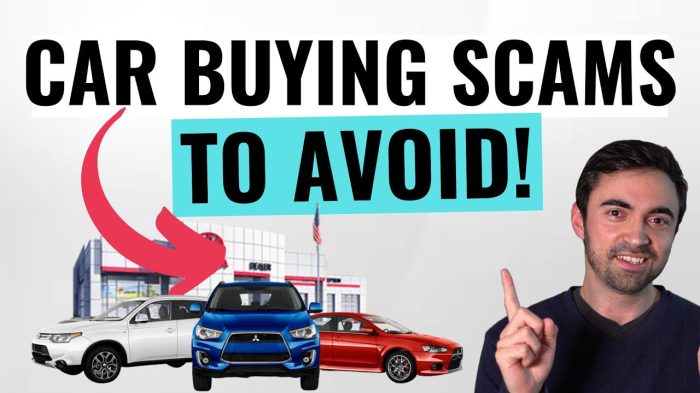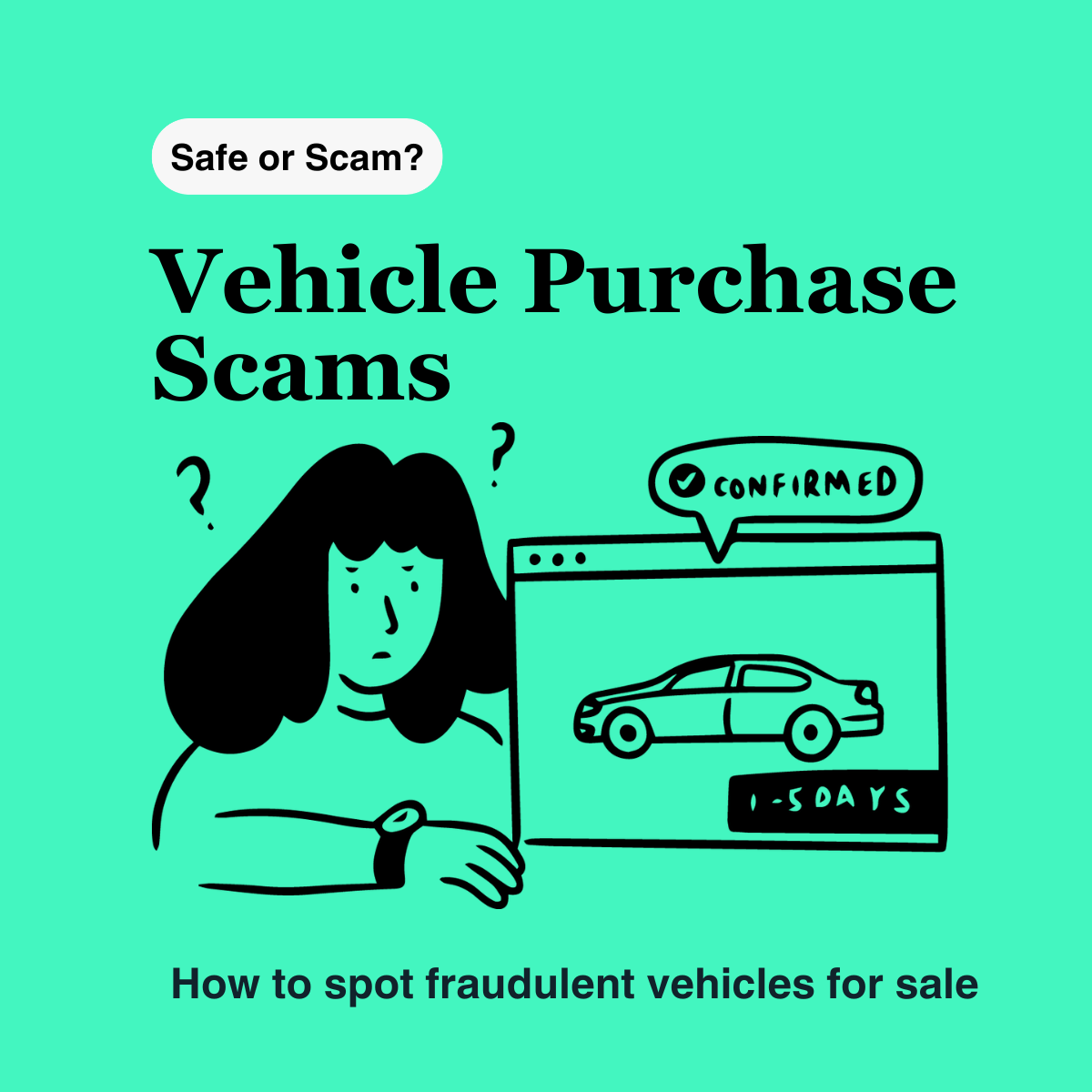How to avoid scams when buying a car online? It’s a totally valid question in today’s digital age. Buying a car online can be super convenient, but it also opens the door to some serious scams if you’re not careful. This guide will walk you through the essential steps to protect yourself from shady dealers and ensure a smooth, safe transaction.
We’ll cover everything from spotting fake listings to securing your payments and protecting your personal info – so you can snag that sweet ride without getting ripped off.
From verifying dealerships and scrutinizing car listings to understanding secure payment methods and protecting your personal data, we’ll equip you with the knowledge to navigate the online car market with confidence. Think of this as your ultimate cheat sheet to avoid becoming the next victim of an online car scam.
Identifying Legitimate Online Car Dealerships

Buying a car online can be a convenient way to find a great deal, but it’s crucial to be aware of potential scams. Navigating the online car market requires a discerning eye and a healthy dose of skepticism. Knowing how to spot a legitimate dealership from a fraudulent one is key to protecting yourself and your money.
Identifying trustworthy online dealerships involves a multi-pronged approach. It’s not enough to simply look at appealing photos and low prices; you need to dig deeper to verify the dealership’s authenticity and ensure a safe transaction. This involves checking their physical presence, online reputation, and website details for inconsistencies.
Dealership Verification Checklist
A reputable online dealership will exhibit several key characteristics. This checklist helps you quickly assess a dealership’s legitimacy.
So you’re looking to buy a car online? Major key is to verify everything – seller’s ID, vehicle history, and even the location. If you’re considering an EV truck, knowing where you’ll charge is crucial, so check out this list of Best States For Ev Truck Charging Stations before committing. Remember to always meet in person to inspect the car before handing over any cash; online scams are super common, so be extra careful!
- Physical Address Verification: A legitimate dealership will have a clearly stated physical address on their website, which should be easily verifiable through online mapping services like Google Maps. Look for street views and confirm the address matches the business listed.
- Contact Information: Multiple contact methods should be available, including a phone number, email address, and possibly a physical mailing address. Be wary of dealerships that only provide limited or vague contact information.
- Online Reviews and Ratings: Check multiple review sites such as Yelp, Google Reviews, and the Better Business Bureau (BBB) to see what other customers have said about their experiences. Look for consistent patterns in positive or negative reviews. A significant number of negative reviews should raise a red flag.
- Website Professionalism: A legitimate dealership will usually have a professional-looking website with high-quality photos, detailed vehicle descriptions, and clear pricing information. Poor grammar, blurry images, or missing information are warning signs.
- Business Registration and Licensing: Check if the dealership is registered and licensed to operate in your state. This information is often available through your state’s Department of Motor Vehicles (DMV) website.
Importance of Verifying Physical Address and Contact Information
Verifying a dealership’s physical address is paramount. A legitimate business will openly display its location. You should be able to find the address on Google Maps and see if it matches the images and descriptions on their website. If the address is vague, nonexistent, or leads to a residential area, it’s a major red flag. Similarly, multiple and easily accessible contact methods demonstrate transparency and accountability, crucial for building trust.
Dealerships relying solely on obscure email addresses or untraceable phone numbers should be avoided.
Checking Online Reviews and Ratings from Multiple Sources
Online reviews provide invaluable insights into a dealership’s reputation. Checking multiple platforms, like Yelp, Google Reviews, and the BBB, allows you to gain a more comprehensive understanding of customer experiences. Focus on the consistency of reviews – a large number of overwhelmingly negative reviews suggests significant problems. Pay attention to recurring themes in the reviews, such as issues with customer service, hidden fees, or vehicle condition discrepancies.
Identifying Red Flags in Online Dealership Websites or Advertisements
Several red flags can indicate a fraudulent online dealership. These warning signs should prompt you to exercise extreme caution.
- Unusually Low Prices: Prices significantly below market value are a major red flag. It’s highly unlikely a legitimate dealership would offer such steep discounts.
- High-Pressure Sales Tactics: Aggressive sales tactics urging immediate decisions without allowing time for due diligence are a clear warning sign.
- Requests for Payment Through Unusual Methods: Be wary of dealerships that only accept payment through wire transfers, prepaid debit cards, or cryptocurrency. These methods make it extremely difficult to recover funds if a scam occurs.
- Lack of Transparency: If information is missing or difficult to find, such as vehicle history reports or detailed terms and conditions, proceed with extreme caution.
- Poor Website Quality: A poorly designed website with grammatical errors, broken links, or low-quality images often suggests a lack of professionalism and credibility.
Comparison of Legitimate and Fraudulent Dealership Websites
This table highlights key differences between legitimate and fraudulent online car dealerships.
| Website Feature | Legitimate Dealership | Fraudulent Dealership | Explanation |
|---|---|---|---|
| Physical Address | Clearly displayed and verifiable | Vague, nonexistent, or misleading | Legitimate businesses are transparent about their location. |
| Contact Information | Multiple options (phone, email, possibly mailing address) | Limited or obscure contact details | Easy access to contact information promotes accountability. |
| Online Reviews | Mostly positive reviews across multiple platforms | Predominantly negative reviews or lack of reviews | Customer feedback provides valuable insights into reputation. |
| Pricing | Prices are competitive and in line with market value | Unusually low prices, often too good to be true | Extremely low prices often mask fraudulent activity. |
Secure Online Payment and Transaction Methods: How To Avoid Scams When Buying A Car Online

Buying a car online offers convenience, but navigating the payment process requires caution. Choosing the wrong method can expose you to significant financial risk, potentially costing you thousands of dollars. Understanding secure payment options and avoiding risky ones is crucial for a smooth and safe transaction.
Unconventional payment methods like wire transfers and cryptocurrency carry substantial risks. Wire transfers, once sent, are nearly impossible to recover if the seller is fraudulent. Cryptocurrency transactions, while seemingly anonymous, lack the buyer protections offered by traditional payment methods. The decentralized nature of cryptocurrencies also makes chargebacks and disputes extremely difficult to resolve. Furthermore, the volatility of cryptocurrency values introduces another layer of risk, as the value of your payment could fluctuate significantly between the time you send it and the time the seller releases the car.
Risks of Unconventional Payment Methods
Wire transfers offer virtually no buyer protection. If the seller disappears after receiving the funds, recovering your money is extremely challenging. Similarly, cryptocurrency transactions lack the robust fraud protection mechanisms available with credit cards or reputable payment processors. The irreversible nature of many crypto transactions means that once the funds are sent, they are gone, regardless of whether you receive the car or not.
Furthermore, the anonymity associated with some cryptocurrencies can make it easier for scammers to operate without fear of being traced.
Secure Online Payment Options
Escrow services and reputable payment processors offer significantly greater security than wire transfers or cryptocurrency. Escrow services act as a neutral third party, holding the funds until both the buyer and seller fulfill their obligations. This ensures that you receive the car as agreed upon before the seller receives payment. Reputable payment processors, like those offered by major financial institutions, offer buyer protection programs and dispute resolution mechanisms.
These protections allow for chargebacks or reversals of payments if the transaction goes wrong.
Importance of Reviewing Payment Platform Terms and Conditions
Before using any online payment platform, carefully review its terms and conditions. These documents Artikel the platform’s liability, dispute resolution process, and buyer protections. Understanding these terms is critical to protecting yourself from potential losses. Pay close attention to sections covering fraud protection, chargeback policies, and the platform’s responsibility in case of disputes. Don’t hesitate to contact the platform’s customer support if you have any questions or concerns before committing to a transaction.
Verifying the Legitimacy of a Payment Platform, How to avoid scams when buying a car online
Verifying a payment platform’s legitimacy is crucial. Look for established platforms with a strong reputation and positive customer reviews. Check for secure connections (HTTPS) and look for indicators of legitimacy such as contact information, physical addresses, and licensing or registration details. Be wary of platforms with poor reviews, vague contact information, or those that pressure you into making a quick decision.
A legitimate platform will be transparent about its fees and processes, and will not pressure you into using their services.
Comparison of Payment Methods
| Payment Method | Security Level | Fees | Risks |
|---|---|---|---|
| Wire Transfer | Low | Low to Moderate | High risk of fraud; difficult to recover funds |
| Cryptocurrency | Moderate to Low | Variable, potentially high transaction fees | High risk of fraud; irreversible transactions; price volatility |
| Escrow Service | High | Moderate | Lower risk of fraud; buyer protection |
| Reputable Payment Processor (e.g., PayPal, credit card) | High | Moderate | Lower risk of fraud; buyer protection; chargeback options |
Protecting Your Personal Information

Buying a car online, while convenient, exposes you to potential risks to your personal information. Cybercriminals are constantly devising new ways to steal sensitive data, so understanding these threats and implementing strong protective measures is crucial. This section will Artikel key strategies to safeguard your personal information during your online car-buying journey.Protecting your personal data during online car purchases requires vigilance and proactive measures.
The risks are real, and the consequences of a data breach can be significant, ranging from identity theft to financial losses. By understanding these threats and following best practices, you can minimize your vulnerability.
Potential Threats to Personal Information
Online car buying exposes you to various threats. Phishing scams, for example, involve deceptive emails or websites mimicking legitimate dealerships to trick you into revealing your personal information, such as login credentials, credit card details, or social security number. Data breaches at dealerships or third-party service providers can also expose your information if their security measures are inadequate. These breaches can leak personal data to malicious actors who can use it for fraudulent activities.
Additionally, unsecured Wi-Fi networks can make your data vulnerable to interception by hackers.
Safeguarding Personal Data Through Website and Email Verification
Avoiding suspicious websites and emails is paramount. Legitimate dealerships will have secure websites with “https” in the URL and often a security seal indicating verification by a trusted third party. Be wary of emails requesting personal information; legitimate dealerships rarely request sensitive data via email. Always verify the sender’s email address and contact the dealership directly through their official website or phone number to confirm the authenticity of any communication.
Look for inconsistencies in grammar, spelling, or branding that could indicate a phishing attempt. If something seems off, err on the side of caution and don’t click any links or provide any information.
So you’re trying to snag a sweet ride online? Major key is to verify everything – seller info, car history reports, the whole shebang. And since you’re considering EVs, it’s also smart to check out safety ratings; read up on how they perform in crashes by checking out this article: How Safe Are Evs In Crash Tests?
. Knowing this will help you make informed decisions and avoid getting ripped off. Always meet in a public place for the transaction, too!
Best Practices for Creating Strong Passwords
Strong, unique passwords are essential for protecting your online accounts. Avoid using easily guessable passwords like birthdays or pet names. Instead, create passwords that are long (at least 12 characters), include a mix of uppercase and lowercase letters, numbers, and symbols. Consider using a password manager to generate and securely store complex passwords for each of your online accounts.
Never reuse the same password across multiple websites or services. A breach on one site could compromise all your accounts if you use the same password.
Importance of Secure Wi-Fi Networks
Using secure Wi-Fi networks is critical when accessing sensitive information, such as financial details or personal data. Avoid using public Wi-Fi hotspots for online car purchases, as these networks are often unsecured and vulnerable to eavesdropping. If you must use public Wi-Fi, consider using a VPN (Virtual Private Network) to encrypt your data and protect it from interception. At home, ensure your Wi-Fi network is password-protected and regularly updated with the latest security patches.
Steps to Take if Personal Information is Compromised
If you suspect your personal information has been compromised, take immediate action.
| Step | Action |
|---|---|
| 1. Change Passwords | Immediately change passwords for all online accounts that may have been affected. |
| 2. Monitor Accounts | Closely monitor your bank accounts, credit reports, and other financial accounts for any unauthorized activity. |
| 3. Report to Authorities | Report the incident to the appropriate authorities, such as the Federal Trade Commission (FTC) or your local law enforcement. |
| 4. Contact Dealerships | Contact the online dealership involved and inform them of the potential breach. |
| 5. Place Fraud Alerts | Place fraud alerts on your credit reports with the three major credit bureaus (Equifax, Experian, and TransUnion). |
Negotiating and Finalizing the Deal
Successfully navigating the final stages of an online car purchase requires a blend of assertive negotiation and meticulous verification. Remember, even though the process is digital, the core principles of a fair deal remain the same. This section Artikels the key steps to ensure a smooth and satisfactory transaction.
Online Price Negotiation Strategies
Effective online negotiation hinges on research and a confident approach. Before engaging with a dealer, thoroughly research the car’s market value using resources like Kelley Blue Book or Edmunds. Knowing the fair price gives you leverage. Don’t be afraid to counteroffer – politely but firmly state your price limit, justifying it with your research. Be prepared to walk away if the dealer is unwilling to compromise.
Consider factors like the car’s condition, mileage, and features when making your offer. Remember to factor in any applicable taxes and fees. A successful negotiation often involves a give-and-take approach, focusing on finding a price point agreeable to both parties. For example, you might negotiate a lower price in exchange for waiving a minor detail like a detailing service.
Verifying the Car’s Condition Upon Delivery or Pickup
Upon receiving the car, a thorough inspection is crucial. Compare the vehicle’s condition to the online listing and any photos provided. Check for any discrepancies or damage not previously disclosed. Take detailed photos and videos documenting any imperfections. If possible, have a trusted mechanic inspect the vehicle before finalizing the payment.
This preemptive step can save you from costly repairs down the line. For instance, if the listing described the car as having “minor scratches,” but upon inspection you find significant dents, this documentation provides evidence for negotiation or dispute resolution.
Obtaining Necessary Documentation
Securing the proper documentation is paramount. This includes the vehicle’s title, a bill of sale clearly outlining the purchase price, payment method, and the date of sale, and any warranty information. Ensure the title is properly signed over to you and reflects the correct vehicle identification number (VIN). If the dealership is out of state, confirm the legality of the online transaction and any required paperwork for your state’s Department of Motor Vehicles (DMV).
Failure to obtain these documents can lead to significant legal and logistical problems later. A complete and accurate bill of sale protects both buyer and seller.
Resolving Disputes
Despite careful planning, disputes can arise. Document everything – emails, messages, photos, and the contract. If a problem occurs, attempt to resolve it directly with the dealership first. If this fails, consider mediation or contacting your state’s Attorney General’s office or consumer protection agency. In extreme cases, legal action may be necessary.
Keeping a detailed record of all communication and transactions will strengthen your case. For example, if the car arrives with significant mechanical issues not disclosed in the listing, your documentation will support your claim.
Essential Documents Checklist
Before finalizing your online car purchase, ensure you have the following:
- Vehicle title signed over to you.
- Bill of sale with all relevant details.
- Proof of payment (e.g., bank statement, cashier’s check).
- Vehicle history report (Carfax or AutoCheck).
- Warranty information (if applicable).
- Copy of the online sales contract.
Understanding Your Rights as a Buyer
Buying a car online opens you up to a whole new set of potential issues, but thankfully, you’re not completely on your own. Several consumer protection laws are in place to safeguard your interests and help you navigate the complexities of online car sales. Understanding these rights is crucial to a smooth and successful transaction.Consumer protection laws vary by state and sometimes even by municipality, but generally, they aim to prevent fraud and ensure fair practices in the marketplace.
These laws often cover aspects like accurate advertising, disclosure of vehicle history (including accidents and repairs), and the implied warranty of merchantability – meaning the car should be fit for its intended purpose (driving!). Federal laws, like the Truth in Lending Act, also apply, dictating how financing terms must be presented and ensuring you understand the total cost of your loan.
State Lemon Laws and Dispute Resolution
Many states have “lemon laws” designed to protect consumers from purchasing defective vehicles. While these laws primarily address new car purchases from dealerships, some aspects may apply to used cars sold online, especially if the seller is a licensed dealer. These laws typically Artikel procedures for resolving disputes involving significant defects that cannot be reasonably repaired. If you believe you’ve purchased a “lemon” online, you’ll want to research your state’s specific lemon law provisions.
Many states also offer alternative dispute resolution (ADR) programs, such as mediation or arbitration, as a way to resolve disputes between buyers and sellers without resorting to costly litigation. These programs can be a cost-effective way to find a mutually acceptable solution.
Discrepancies Between Listing and Actual Vehicle
If the car you receive significantly differs from what was advertised online, you have legal recourse. The level of this recourse depends on the nature of the discrepancy and the terms of the sale. Minor discrepancies, such as a slightly different shade of paint than depicted in photos, are unlikely to be grounds for a legal challenge. However, significant discrepancies – a hidden accident history not disclosed, major mechanical issues not mentioned, or the car being a completely different model than advertised – could lead to legal action.
In such cases, you may be able to void the contract, demand a refund, or sue for damages. Always thoroughly document any discrepancies, taking photos and videos of the vehicle upon delivery, and keeping copies of all communication with the seller.
Resources for Filing Complaints or Seeking Legal Assistance
If you encounter problems with an online car purchase, several resources can help. Your state’s Attorney General’s office often handles consumer complaints and may be able to mediate a dispute or investigate fraudulent activity. The Better Business Bureau (BBB) also provides a platform for filing complaints and accessing information on businesses. For legal assistance, you can consult with a consumer protection attorney specializing in automobile sales.
Many offer free initial consultations. Depending on your situation, you might also consider contacting the Federal Trade Commission (FTC) if you suspect a scam or widespread fraudulent activity.
Questions to Ask the Seller to Protect Your Rights
Before finalizing any online car purchase, asking specific questions can significantly protect your rights. This proactive approach can help you avoid future problems.
- Can you provide a complete vehicle history report (e.g., Carfax or AutoCheck)?
- Are there any known mechanical issues or required repairs? If so, please provide details.
- Is the vehicle free of liens or encumbrances?
- What is the return policy or guarantee in case of discrepancies between the listing and the actual vehicle?
- What is the process for handling complaints or disputes?
- What is the seller’s full name, address, and contact information?
Conclusive Thoughts
So, you’re ready to tackle the online car market? Awesome! Remember, buying a car online can be a great experience, but only if you’re prepared. By following the tips and tricks Artikeld in this guide, you’ll be well-equipped to navigate the potential pitfalls and make a smart, secure purchase. Don’t let the fear of scams hold you back from finding your dream car – just stay vigilant, do your research, and you’ll be cruising in no time!









